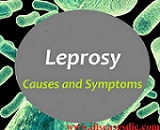Introduction Pinworm Infection (Enterobrosis) is a benign intestinal disease caused by a short spindle-shaped worm 1/4 -1/2 inches long and whitish color. It may occur in both children and adults and usually infects the whole family. The adult worms reside in the colon of the host and the females deposit …
Read More »Typhoid – History, Causes, Treatment, and Prevention
Definition Typhoid fever is caused by Salmonella typhi bacteria. Typhoid fever is rare in industrialized countries. However, it remains a serious health threat in the developing world, especially for children. Typhoid fever spreads through contaminated food and water or through close contact with someone who’s infected. Signs and symptoms usually …
Read More »Syphilis – Complications, Symptoms, Diagnosis and Treatment
Definition Syphilis is an infection by the Treponema pallidum bacteria that is transmitted by direct contact with a syphilitic sore on the skin, and in mucous membranes. A sore can occur on the vagina, anus, rectum, lips, and mouth. It is most likely to spread during oral, anal, or vaginal …
Read More »Vaginitis – Types, Causes, Symptoms, Treatment, and Prevention.
Definition “Vaginitis” is a medical term used to describe various disorders that cause infection or inflammation of the vagina. Vulvovaginitis refers to inflammation of both the vagina and vulva (the external female genitals). These conditions can result from an infection caused by organisms such as bacteria, yeast, or viruses. In …
Read More »Mumps – Definition, History, Risk Factors, and Treatment.
Definition Mumps is an infection caused by a type of virus called a paramyxovirus. It is very contagious and spread in saliva, the same way as a cold or flu. This means it can be caught from an infected person coughing, sneezing, etc. It can also be caught from touching …
Read More »Encephalitis – Causes, Symptoms, Treatment, and Prevention.
Definition Encephalitis (en-sef-uh-LIE-tis) is inflammation of the brain. There are several causes, but the most common is viral infection. Encephalitis often causes only mild flu-like signs and symptoms such as a fever or headache or no symptoms at all. Sometimes the flu-like symptoms are more severe. It can also cause …
Read More »Leprosy – Causes, Complications, and Medications.
What is leprosy? Leprosy, also known as Hansen’s disease (HD), is a chronic infectious disease caused by a Mycobacterium (Mycobacterium leprae) affecting especially the skin and marginal nerves. It is characterized by the formation of nodules or macules that enlarge and spread with loss of sensation and eventually paralysis, wasting …
Read More »Influenza or Flu: Symptoms, Complications, and Treatment.
Introduction Influenza is a viral infection that attacks your respiratory system — your nose, throat and lungs. Influenza is caused by three types of RNA viruses called influenza types A, B and C (considered different genera), which all belong to the family Orthomyxoviridae. The disease, colloquially called “flu” in humans, …
Read More » Diseases Treatments Dictionary This is complete solution to read all diseases treatments Which covers Prevention, Causes, Symptoms, Medical Terms, Drugs, Prescription, Natural Remedies with cures and Treatments. Most of the common diseases were listed in names, split with categories.
Diseases Treatments Dictionary This is complete solution to read all diseases treatments Which covers Prevention, Causes, Symptoms, Medical Terms, Drugs, Prescription, Natural Remedies with cures and Treatments. Most of the common diseases were listed in names, split with categories.








